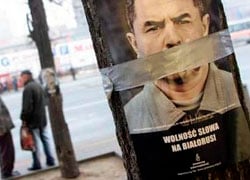No liberalization expected. KGB accuses independent press in extremism
5- 24.11.2008, 8:47

ARCHE magazine’s editor-in-chief received a letter from the Brest customs, where copies of the magazine were confiscated. It reads that in accordance with the conclusion the State Security Committee (KGB) of November 5 issue 7-8 2008 “calling to extremist activity and its propaganda were found” in the magazine.
Materials of the case on this were sent to the Maskouski district court of Brest “applying to recognize this information materials extremist and to destroy it,” “Nasha Niva” newspaper writes.
Which material of the commemorative issue (the magazine marks its 10th anniversary) does have extremist character? Valer Bulhakau, «ARCHE» ’s editor-in-chief, experts of the Belarusian KGB may have interpret in this way analysis of famous Belarusian politologist V. Silitski on the “parliamentary elections”, or a round table on mass detentions of opposition activists after the 3 July blast, or a film critic Rasinski’s review of Katyn film by A. Waida, where the author brings Soviet secret police into line with fascists. The issue, dedicated to pre-Soviet history of Belarus, contains two historical monographs translated from English and Polish and about thirty articles, mainly scientific and historical.
Similar attempts of recognising different editions extremist were made by the KGB in another western city - Hrodna. Information materials, confiscated by vigilant customs officers were sent to court. Among them were leaflets of presidential candidate Milinkevich and different newspapers and magazines in Belarusian. Opposition figures, put on search lists, were even seized books they were reading in trains.
Fortunately, cases of Hrodna were inconclusive – the court sent the materials back having found fault in formalities. They said there were mistakes in claim of the head of the regional KGB department.
We deal with purposeful intimidation of both editors and readers, with attempt of the secret services to recover censorship functions V. Bulhakau supposes. This was practiced in totalitarian states – Nazi Germany and the Soviet Union.
ARCHE magazine is an independent scientific and socio-political edition, its authors are tens of Belarusian intellectuals. Due to its high quality, he had become the only Belarusian edition, included in Eurozine, a network of European cultural journals.
ARCHE’s editor doesn’t exclude he will have to appeal to intellectuals and cultural editions of European countries to start a campaign of solidarity.
As it has recently become known, the authorities are going to return “Narodnaya Volya” and “Nasha Niva” newspapers to the state system of printing and distribution. The Belarusian regime called these actions “a step towards liberalization”. However, we can see that persecution of other independent editions have begun in the country.










